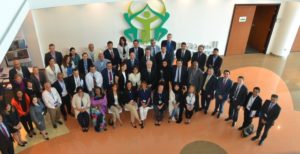Dubai Hosts World Humanitarian Summit Regional MENA Business Consultation
More than 60 representatives from the United Nation agencies, humanitarian organisations and the private sector have explored innovative ways of improving collaboration and better harnessing private sector support in emergency preparedness and response at a meeting held recently in Dubai at the International Humanitarian City, IHC.
During the opening remarks, Shaima Al Zarooni, IHC CEO, emphasised the importance of the business community’s engagement in the humanitarian operations, saying, “This dialogue is necessary to develop sustainable partnerships with businesses that empower humanitarian agencies during critical times.”
Al Zarooni added, “We need to enhance the private sector’s contributions to emergency preparedness and response, share their experiences, and define tangible actions to advance partnerships with regional entities, government departments and humanitarian actors. This is essential if we are to seek innovative solutions to current humanitarian challenges.”
The consultation is part of the UN Secretary-General Ban Ki-moon’s agenda for a new business model for emergency preparedness and response, with findings, recommendations and follow-up actions feeding into the World Humanitarian Summit, WHS, to be held in Istanbul, Turkey, in 2016. The Middle East and North Africa, MENA, Regional Business Consultation is the fifth in a series of regional consultations to bring the voice of business to the summit.
Building on the outcomes that emerged from the WHS MENA regional consultation, there was agreement to strengthen the partnership between humanitarians and the private sector. This includes developing regional and national hubs that promote sustained dialogue and serve as a platform for collaboration. There was agreement to explore partnerships on emergency preparedness initiatives, including joint risk assessments, contingency planning and simulations.
The role of businesses in emergency preparedness and response has evolved from traditional corporate social responsibility and philanthropy-focused support to more innovative partnerships. These partnerships enable firms to leverage their support in areas of common interest such as how to minimise supply chain disruption after a disaster or how to engage customers and reopen markets post-disaster.
“It has become essential for the humanitarian community to not only strengthen and broaden its network of partners but also seek more innovative approaches to saving lives. The private sector is central to these efforts as they have the proven ability to make unique contributions from their resources, skills and networks on the ground,” said Marcy Vigoda, Director of the Partnership and Resource Mobilisation Branch at OCHA.
Co-hosted by the IHC and OCHA, the consultation provided insights from past and ongoing emergencies in the region, with the exchange of ideas and commitments made paving the road towards a much needed business model of emergency preparedness and response.







